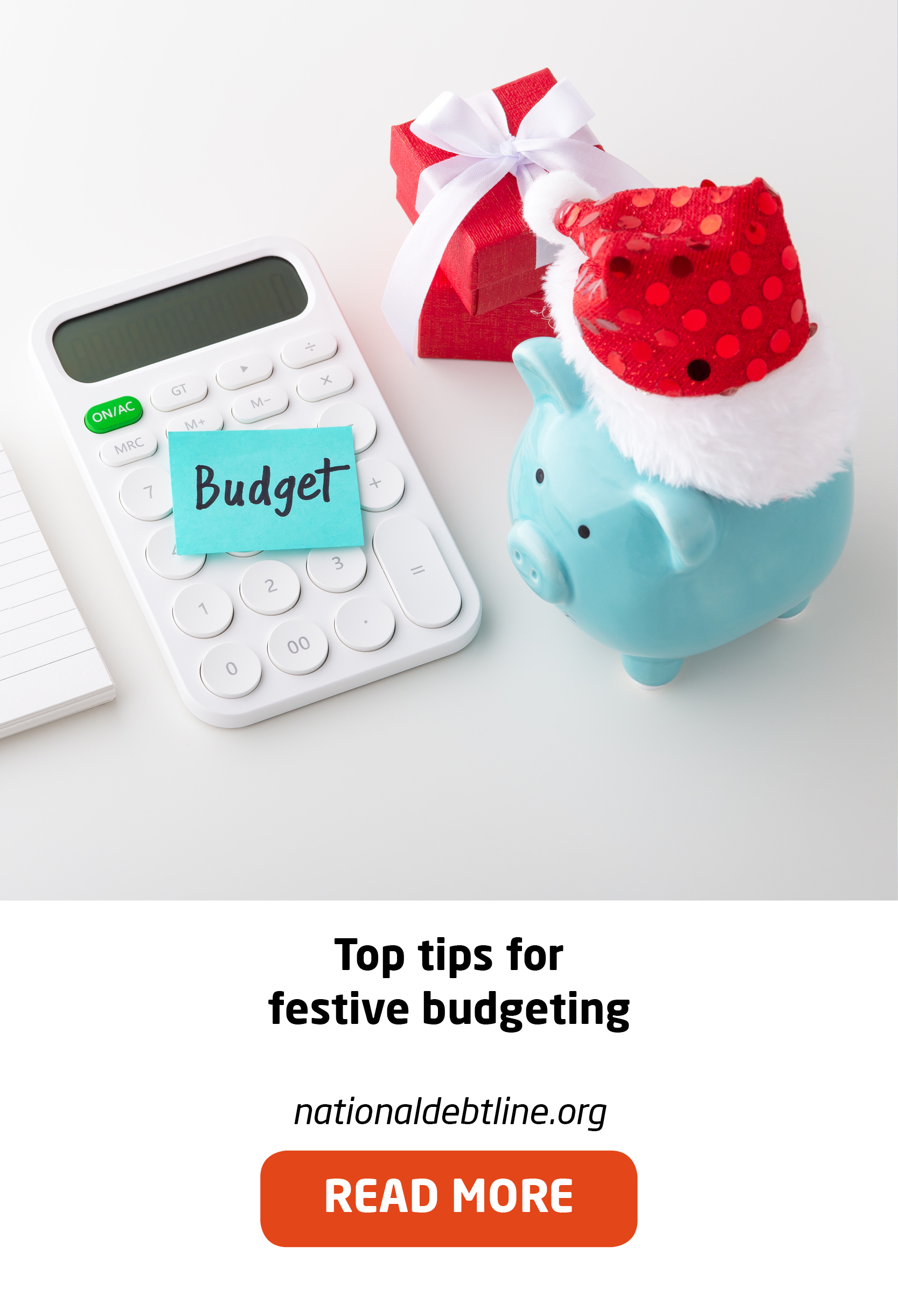
As our health and mental wellbeing is important, so is our financial wellbeing. If we cannot keep our finances in check this can lead to an array of mental health issues. What can you do, to stay on top of your finances? Dealing with extra spending over Christmas and managing finances successfully are all services we can provide.

 The Electrical Industries Charity (EIC) understands how important a support network can be to those who have suffered from any form of domestic violence. This is why the Charity launched the Employee Assistance Programme (EAP) and Financial Health Check services, which offer people within the electrical sector emotional, financial and practical support and provide advice and useful information on how to manage their day to day finances as they embark on their road to recovery following a traumatic life event.
The Electrical Industries Charity (EIC) understands how important a support network can be to those who have suffered from any form of domestic violence. This is why the Charity launched the Employee Assistance Programme (EAP) and Financial Health Check services, which offer people within the electrical sector emotional, financial and practical support and provide advice and useful information on how to manage their day to day finances as they embark on their road to recovery following a traumatic life event.
One example where EIC was able to show support through the Financial Health Check and EAP is single mum Sabrina who works for an electrical wholesaler. Sabrina reached out to EIC for help after struggling mentally and financially following her relationship with a violent and abusive partner, which has resulted in her taking time off work due to severe stress and depression.
The constant changes in her benefits and loss of pay when off sick for prolonged periods have meant that debt and not coping financially had become a way of life. While supporting Sabrina financially, it was discovered that she was spending a lot of her budget on takeaways and cheap but not very nutritious ready meals, and her food shopping and general purchases had become very erratic too.
Sabrina admitted that although she was able to cook, being stressed and always worrying about money meant she was not thinking clearly and had not thought about meal planning for many years. EIC found some great books for cooking healthily on a budget and helped Sabrina to set the meal and food shopping plans as well as creating a shopping list of essential items.
Sabrina has two teenage daughters and has found it difficult to withstand their desires and wants for items that she really cannot not afford. Christmas is a common time of year for families to over-spend under pressure. Sarah wanted to buy the new smartphone her elder daughter needed to help with her college course but didn’t know how she would find the funds.
Pressures of modern-day life can heighten the feelings of stress even more and for those who already suffer from this mental health condition, events such as Christmas can be an extremely difficult time.
A third of Britons are borrowing money to pay for presents at Christmas, while one in five are taking on credit to pay for food, according to new research by the Money Advice Trust.
A poll of more than 2,000 British adults conducted for the Money Advice Trust by YouGov found a significant proportion relying on credit to get through the Christmas season, with some missing payments on household bills to cope financially. At the same time, relatively few people are taking the pro-active steps required to manage Christmas finances.
Setting a festive budget is probably the single most useful step you can take to manage your Christmas spending – but only one in four of us do this! Make a list of who you need to buy presents for, set a budget for each and stick to it! Plan ahead when it comes to your other shopping too, for example on food, decorations, and visiting family and friends.
None of us really want to think about personal finances in the run up to Christmas, especially where debt problems are involved. However, if you are already worried about your debt, get advice now. Don’t wait until the New Year.
Sarah admitted that being stressed, depressed and always worrying about money meant that her relationship with her children wasn’t the best, and she constantly felt she had to give in to their demands to prevent rows. This often meant that she would fail to pay the rent shortfall, choosing her daughters demands as higher priority.
The EIC were able to put Sarah in contact with her local social services and Sarah was also referred to a women’s group that have given her support with regards to budgeting and parenting. Sarah is finding the onlook of this Christmas a little less distressing and feels she has more confidence to be able to plan and manage her budgets more effectively over the seasonal period, which will make it a more enjoyable time for her and her family.
Domestic abuse affects all areas of life and can be extremely difficult to overcome, but with the right level of support it is possible to turn over a new leaf and start creating a promising future for yourself and your family.
If you or someone you know are finding the Christmas season distressing or require assistance, please contact the EIC support team: This email address is being protected from spambots. You need JavaScript enabled to view it. or 0800 652 1618.

Brian had suffered a trauma many years ago, and subsequently began drinking heavily which was affecting his marriage and relationship with his son who was diagnosed as being on the autistic spectrum. He had a good job and appeared to be coping on the face of it.
However, part of his mental health issues manifested in a need to buy things for others – whether it was going out with colleagues from work and insisting he paid for everything – he would literally go up to the bar or restaurant till and tell them he was paying from the start! Then his son – his relationship with his wife was souring and he felt the need to buy things – he would spend £400 on a Christmas present for him, when the reality was his boy just wanted to spend time with dad. His wife put a party on for his son’s birthday, Brian felt he had to pay for it all.
His heavy drinking had turned to alcohol addiction and in May 2017 he was referred for detox and rehab followed by 2 further sessions when he relapsed. Brian had been dry for 20 months when he hit a stressful passage; working long hours following a change in employment he was unable to get his AA meetings and felt unable to contact his Mentor or other support.
His spending like this can be a problem for many – there is an element of buying “love” or buying expensive presents instead of making the time to do things. And along with the drinking that is all part of Christmas and the festive season, it can get seriously out of control.
It has taken some time for Brian to come to terms with his spending behaviour but he did eventually do so with therapy; he is now annoyed with himself that he has broken a near 2 year dry period, but determined that this will be the last relapse.

Depression and trauma affect many areas of life, and this includes your finances. This is why it is essential you get help as soon as you realise there is an issue - whether you find yourself in debt or just unable to cope.
Through its Employee Assistance Programme (EAP), which is funded by powerLottery, the Electrical Industries Charity (EIC) provides people within the electrical sector with a wide range of support services to help them overcome any physical, emotional and financial challenges at hand. Additionally, EIC also launched a financial health check that offers people within the electrical sector advice and practical information on how to manage their day to day finances and provides help and support with getting their finances in order before they get out of hand.
Uncontrollable spending can be a problem for many as there is an element of buying “love” or buying expensive presents instead of making the time to do things. It can get seriously out of control and Christmas is often a time when this happens.
If you or someone you know is struggling to cope with the financial strain, anxiety and stress of the Christmas season or any time of year or having difficulty in overcoming addiction and require support, please contact the EIC support team: This email address is being protected from spambots. You need JavaScript enabled to view it.
or 0800 652 1618.
- One in 10 worry and feel stressed about money in the run up to Christmas
- One third of Britons are putting Christmas presents on credit this year
Five million Britons suffer from money worries and stress in the run up to Christmas, and one in three adults are putting Christmas presents on credit this year, according to new research from National Debtline, run by charity the Money Advice Trust.
The research, based on a poll of more than 2,000 British adults conducted online by YouGov for National Debtline, suggests that around five million people ‘regularly worry’ and ‘feel stressed’ about money in the run up to Christmas, with three million experiencing a negative impact on their enjoyment of the holiday as a result.


We spoke to Consultant Psychiatrist, Dr Jaya Gowrisunkur, about coping with stress during a time that can have a negative impact on mental health. We explore the causes of stress, the most appropriate treatment, and the best ways to avoid the pressures of Christmas.
Stress is a normal, necessary and adaptive response that helps us to deal with the challenges of life and the environment around us. When we perceive a threat, our ‘fight or flight’ reaction is triggered, which acts as an aid to survival and a way of managing change.
We all experience stress at some point in our lives but different people have different capacities to cope with and manage it. Some individuals thrive on high levels of stress, such as in stressful working environments, whereas others struggle a lot more with the pressure.
Coping with Christmas
Pressures of modern-day life can heighten the feelings of stress even more and for those who already suffer from this mental health condition, events such as Christmas can be an extremely difficult time.
Christmas is seen by most people as being a time for celebration – music, bright lights, presents, treats, socialising with family and friends and lots of food and drink. Sadly, this image is far from some people’s reality and issues associated with Christmas may cause significant stress. These issues may include:
• Expectations to socialise and spend more money
• The emphasis on loneliness at this time of year causes greater sadness
• Feelings of loss or grief are heightened
• Additional cleaning and cooking on top of already busy lives causes added pressure
• Arguments amongst family during a time of closer proximity causes added tension
• Financial worries are heightened with demands for buying the best gifts
• Pressures on parents to provide the perfect Christmas for their children
A study conducted by eBay compared Christmas shopping to running a marathon in terms of the stress that it produces on the body, with women and the over-45s finding the experience the most pressurising and intense. 60% of those surveyed experienced shopping fatigue after 32 minutes and heart rates increased by an average of 33% during this time.
During stressful periods such as Christmas, it is important for individuals to find safe outlets for emotions such as going to the gym or chatting to a friend. Below are some practical tips to share:
• Spread out your diary – it is OK to hold events in November and/or plan some for January
• Prepare and plan in advance how your time is going to be shared
• Organise, prioritise and set achievable goals
• Set yourself a budget before Christmas shopping
• Share the load – allocate tasks and give other people responsibility

A third of Britons are borrowing money to pay for presents at Christmas, while one in five are taking on credit to pay for food, according to new research by the Money Advice Trust. .
A poll of more than 2,000 British adults conducted for the Money Advice Trust by YouGov found a significant proportion relying on credit to get through the Christmas season, with some missing payments on household bills to cope financially. At the same time, relatively few people are taking the pro-active steps required to manage Christmas finances.
More than a third of Britons surveyed (34 percent) have already borrowed, or plan to borrow, money to cover the cost of Christmas presents – a figure equating to an estimated 16.9 million people. Of these, more than three quarters (76 percent) are borrowing on credit cards (12.8 million people), with others borrowing from bank overdrafts (2.9 million), catalogue credit (2.6 million) and store cards (1.9 million). More than one in five (21 percent) have already borrowed, or plan to borrow, to put food on the Christmas table – equating to an estimated 10.4 million people.
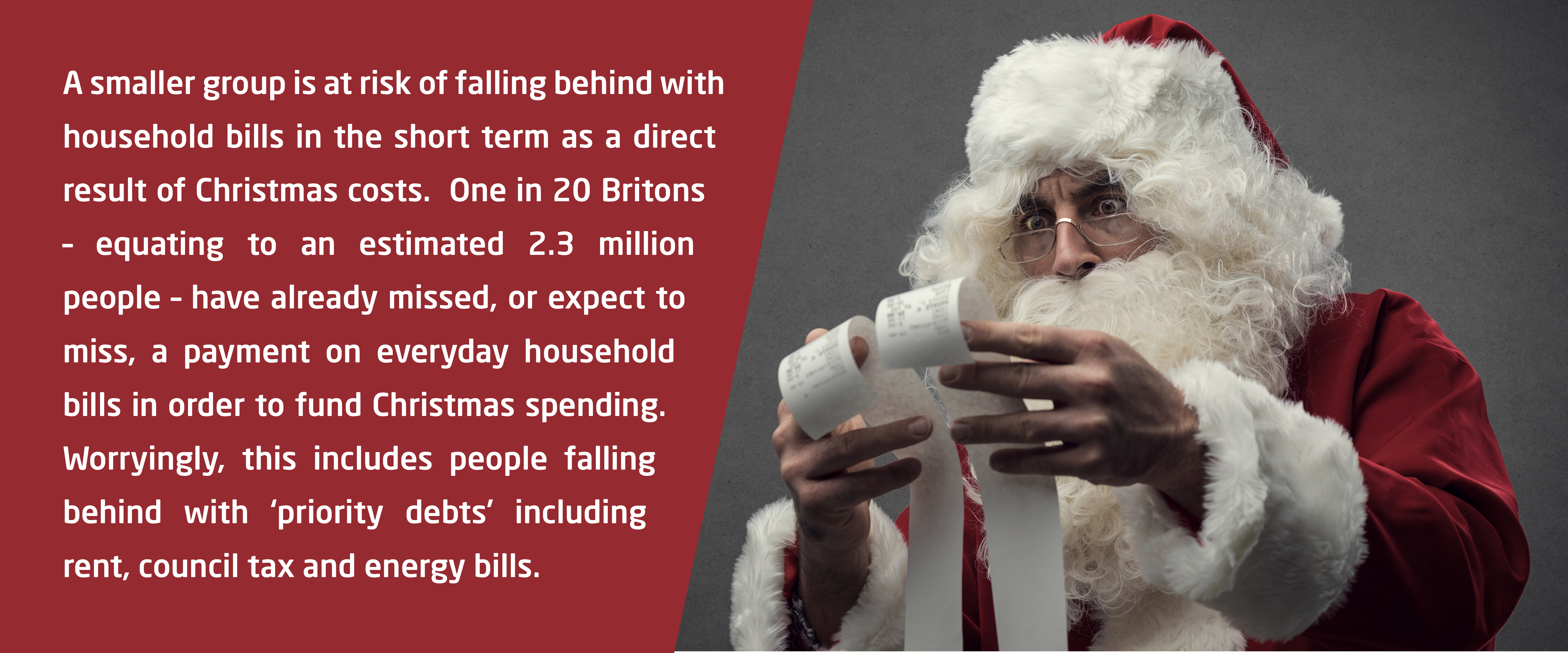
Amid this high level of Christmas borrowing, which comes on top of new Bank of England figures showing a significant boom in consumer credit lending more generally, the Money Advice Trust is expecting an increase in the need for free debt advice in January.
The charity’s research shows that the need for this kind of preventative advice is significant, with only one in four Britons (25 percent) having set a budget for Christmas expenditure, and fewer than one in five (18 percent) keeping track of their spending. 22 percent of Britons reported that they had not taken any steps at all to manage their Christmas finances.
National Debtline offers free, independent and confidential advice 24 hours a day online at www.nationaldebtline.org and on 0808 808 4000, Monday to Friday 9am to 9pm, Saturday 9.30am to 1pm (National Debtline phone lines will be open until 1pm on Christmas eve, and will then re-open at 9am on 2nd January).

12 Days of Debt Action – Is designed to help mitigate households’ New Year debt problems and provide simple, practical steps that households can take to reduce the risk of unmanageable debt as a result of Christmas costs.

On the first day of Christmas - Set your festive budget
Setting a festive budget is probably the single most useful step you can take to manage your Christmas spending – but only one in four of us do this! Make a list of who you need to buy presents for, set a budget for each and stick to it! Plan ahead when it comes to your other shopping too, for example on food, decorations, and visiting family and friends.
On the second day of Christmas - Keep paying bills
Don't forget you still need to pay your normal household bills in December, such as mortgage, rent, council tax, gas and electricity. If you get paid early in December you should consider paying these bills straight away, so you know what you have left is what you have to spend on your Christmas shopping.
On the third day of Christmas - Shop around for deals
There are lots of good deals around, even at Christmas. You could leave buying your presents until later in the month as sales often start early. You could also consider using price comparison websites if you are buying a bigger gift. Whatever you do, make sure you shop around and get the best price.
On the fourth day of Christmas - Spread the cost
You may have started saving for Christmas earlier in the year but if you haven't you can still spread the cost of Christmas over December. Start buying non-perishable food items earlier in the month when they are on offer in the supermarket and be sure to take advantage of any loyalty points you have.
On the fifth day of Christmas - Resist borrowing more
It can be extremely tempting to borrow money to pay for Christmas costs, but as always with borrowing, you have to consider whether you can afford to pay it back. If you do decide to take out credit, check the terms and conditions and do a household budget to make sure the repayments won't leave you in difficulty.
On the sixth day of Christmas - Keep a track of spends
We can all get carried away when shopping in December. The single biggest thing you can do to keep in control is to record what you spend. Check it against your budget on a regular basis, and while it's easier said than done, keeping a track of your spending can help you stick to the plan.

On the seventh day of Christmas - Just buy for kids
To save money on presents you could agree in the family to just buy for the children. If you still want to buy for the adults, you could consider doing a ‘Secret Santa’ so that each adult only buys one present. Handmade presents are often cheaper and have that personal touch too.
On the eighth day of Christmas - Get advice early
None of us really want to think about personal finances in the run up to Christmas, especially where debt problems are involved. However, if you are already worried about your debt, get advice now. Don’t wait until the New Year.
On the ninth day of Christmas - Spend time, not just money
Often the most cherished part of Christmas is not the presents you receive; it’s spending time with friends and family. Amid all the hustle and bustle of the festive season, make sure you don’t let worrying about your personal finances get in the way of enjoying the time you have – take early action instead and seek free advice if your debts are taking over.
On the tenth day of Christmas - Plan your Christmas dinner
Christmas dinner can be a budget-breaker in itself. To keep costs under control it’s crucial to plan ahead, shop around and make sure you aren’t left rushing around the supermarket shelves on Christmas Eve! If a number of you are getting together for Christmas dinner, consider bringing a course each. It’s much less stress and a lot cheaper.
On the eleventh day of Christmas - Look out for free activities
With the kids off school there is always pressured to keep them entertained, and if you’re not careful the cost of keeping them busy will soon mount up! There should be lots of free activities in your area over the holiday period, so look out for these advertised in the local paper and community centres.
On the twelfth day of Christmas - Have a stress-free Xmas
Merry Christmas everyone! We hope it is filled with love and laughter. If you need advice or support over the Christmas period you can get free debt advice 24 hours a day at www.mymoneysteps.org. In addition, the National Debtline phone lines are open until 1pm on Christmas Eve and open again from 2nd January – call us on 0808 808 4000

When debt is something you’re already struggling with, spending big at Christmas is the last thing you need. We talked to Financial Mindfulness Founder and CEO, Andrew Fleming about the personal cost of financial stress and how you can take steps to improve your financial wellbeing.

The personal cost of financial stress
The physical and emotional impact of feeling the pinch can be very significant. “financial stress leads to anti-social behaviour, relationship conflict and breakdown, isolation, sleep loss and symptoms of depression,” says Andrew. “More than 66% of those suffering financial stress said money worries directly led to feelings of fear, anxiety and/or depression – three times higher than people unaffected by financial stress. They’re eight times more likely to have trouble sleeping, four times more likely to argue with their partner about money and more than a third (35.2%) admitted using alcohol or drugs to manage negative feelings associated with personal finances during the past month. These are just a handful of examples of the negative effects financial stress can have on our lives.
The Christmas consumer trap
It’s a time of year that many of us look forward to and enjoy. But Christmas has also become synonymous with spending money and that’s a problem. The burden this places on our finances can lead to stress and regret, both in the lead up to the festive season and in the New Year when the credit card debts become all too real. So why do we do it when we have so much more to lose than pounds – including our health, sleep and peace of mind? “The thought of not having enough presents, food or alcohol to go around – especially when we’re the host – can fill us with fear,” says Andrew. “We worry about being embarrassed, or maybe we’re trying to cover up the fact that we’re already struggling financially. Many of us are just trying our best to guarantee a happy holiday for our family and friends.”
This fear of being a poor host, parent or friend can make us very vulnerable to the consumer juggernaut that fires up when the festive season gets underway. “Retailers understand this fear we’re motivated by and capitalise on it with their pre-Christmas sales,” says Andrew. “December is generally stressful and your time poor as you race to get all your work out of the way in time for the holidays. Combine all of this pressure with the aggressive marketing techniques of retailers and we end up with a lot of impulse buying going on.”

We like buying things, at least we think we do. It's bred into us. Life in the 21st century is a fast paced, consumer-oriented experience where media surrounds us at all times enforcing the idea that happiness is a matter of buying the perfect house, driving the best car, wearing the trendiest clothes and posting status updates on the latest high tech devices. Everywhere we look we are inundated with the same message: "BUY, BUY, BUY your way to happiness!" While buying a new gadget or the first drive in a new car may be satisfying or thrilling for a short while, the thrill always fades and we find ourselves back in the same place seeking the next purchase to keep the feeling going. If this sounds anything like your life, then rest assured there is a better way to spend your money and keep that feeling alive: Stop buying stuff and start buying experiences!
Recent research from San Francisco State University found that people who spent money on experiences rather than material items were happier and felt the money was better spent. The thrill of purchasing things fades quickly but the joy and memories of experiences, from epic adventures to minute encounters, can last a lifetime. Next time you're feeling a bit down or lacking in some way, before you go out and buy things remember these five tips for evaluating your spending and decide to have experiences instead of just accumulating stuff.

1. It's the Little Things
Size doesn't matter . . . in happiness. Most people equate large purchases with large amounts of happiness, and while it's true that buying a Maserati may give you more of a thrill than dining out with your friends, the thrill of a fancy car will soon fade and with the money you spent you could dine out a couple times a week for years in the company of friends and family. Those less intense, but still enjoyable evenings out in the company of loved ones will provide a much longer lasting and more fulfilling happiness than the temporary thrill of a large purchase. Plus, people who have more frequent social interactions live longer, healthier lives and experience less stress, depression and feelings of isolation. Small expenditures of money involving social interactions such as dining out, getting a manicure with friends, going to a concert or meeting up for drinks are a great way to de-stress, have a great time and create lasting memories. Little bits of happiness add up and when spread out, last a lot longer!
2. Giving Is Better Than Receiving
Few things provide a lasting sense of happiness and fulfilment like giving to others. There is very little you can do for yourself which will have the same effect as doing well by someone else. Keep this in mind next time you're wandering the mall, window shopping every store. Instead of seeking out things you may want to buy for yourself, go on a hunt to find the perfect item to surprise your best friend or significant other. Buy your mom a fresh bouquet of flowers or get your dad a new sleeve of golf balls. The experience of surprising a friend or loved one with an unexpected gift will not only make their day, but leave you feeling great about yourself, and that joy will last unlike your temporary excitement over a new watch.
3. Renting Many Beats Owning One
Why buy a vacation home when you can rent 10? Most people's dream of buying a vacation home in Hawaii or owning a sailboat centers mostly around fantasies of laying in the sand or being out on the open water. Very seldom does the fantasy include remembering to pay the utilities or ensuring that a bilge pump is functioning properly. Resist the urge to spend huge sums of money on anything that you can rent. “Exotic items” like vacation houses, RVs, cars, boats, horses and even high end designer clothes can all be rented. The money you would spend to own any one of these things could be used to rent all of them and the benefit to renting is that you aren’t responsible for it once you’re done using it. Be honest with yourself, how many times a year can you really afford to fly to Hawaii and stay for weeks at a time? For most people, it’s not nearly enough to justify purchasing a vacation home and the same goes for most other exotic items. When you rent, you just show up and have a great time and when you’re done you head off to your next experience without any of the burdens and responsibilities of ownership and having spent a fraction of the money! Long story short: You don’t really want to own a horse; you want to ride a horse and there is a big difference.

4. Feeling Good Is Better Than Looking Good
Be honest with yourself, are those £300 jeans going to make you happy tomorrow? Next week? Now how about a £50 pair of jeans and a £25 massage every Friday for the next four weeks? Trying to look like a movie star or a fashion model is a pricy endeavour and, in the end, the only one who comes out ahead is your credit card company. Instead of spending your hard-earned bread on clothes and jewellery to make yourself look better, spend that money on activities that will make you feel better. A gym membership or bi-weekly trips to the spa is a great way to pamper yourself and de-stress and you’ll come away from a visit feeling refreshed and invigorated unlike walking out of a department store feeling guilty for overspending. Think about it like this: The price of one designer handbag could pay for a month of yoga classes and while the handbag may go perfect with your red heels it won’t make your butt look good.
5. Learning Lasts A Lifetime
One of the very best things you can do with money to maximize the happiness return on your financial investment is learning a new skill or hobby. Take a class in woodworking or skydiving or fencing or quilting (yes, quilting.) Buy private golf or tennis lessons. Learn to surf. Enrol in a creative writing class or learn to paint. Get yourself a camera and join a photography club. Not only is the act of learning a new skill fun and rewarding but you will broaden your horizons as a person, giving yourself fun new activities that you can participate in for a lifetime of fulfilment while expanding your social circle at the same time. Spending your time and money on the development of new skills is a fantastic way to meet new people and explore new avenues of life you may never have considered. The thrill of exploration can come from learning to tango, you don’t have to climb mountains. Expanding yourself as a person will expand the ways in which you can experience joy, there is almost no downside. So, go attend that transcendental meditation weekend retreat you've been dreaming of, it's money well spent!
With all things in life, there is no guarantee that you will always have a good experience. You may very well return from your epic vacation to the Brazilian rain forest with monkey lice, shit happens. But nine times out of 10 you’re better spending your money on experiences and other people than on yourself. You’re much more likely to have genuine, fulfilling happiness as a result. So remember: You want to be happy? Stop buying things and start buying experiences!


I remember my first Christmas as a single parent. For the first time since my children were born, I was solely financially responsible for Christmas. Just the thought of it all made me stressed. Stress before during and after Christmas is a common occurrence for single parents due to carrying the brunt of all the celebratory responsibilities and their price tag alone. Not only that, there are also many changes and adjustments for the family, and Christmas can be particularly difficult. From finances to time spent with the children, it all changes.
In light of this, I had to sit down before Christmas and think through all the things that we used to be able to do and how much it all cost. There would be no way with my new single income that I would be able to keep up with the way of the past, so I wrote a list and divided it into:
1. the things that were most important to us
2. things that I would like to keep
3. the things that we could let go of or didn’t really need.
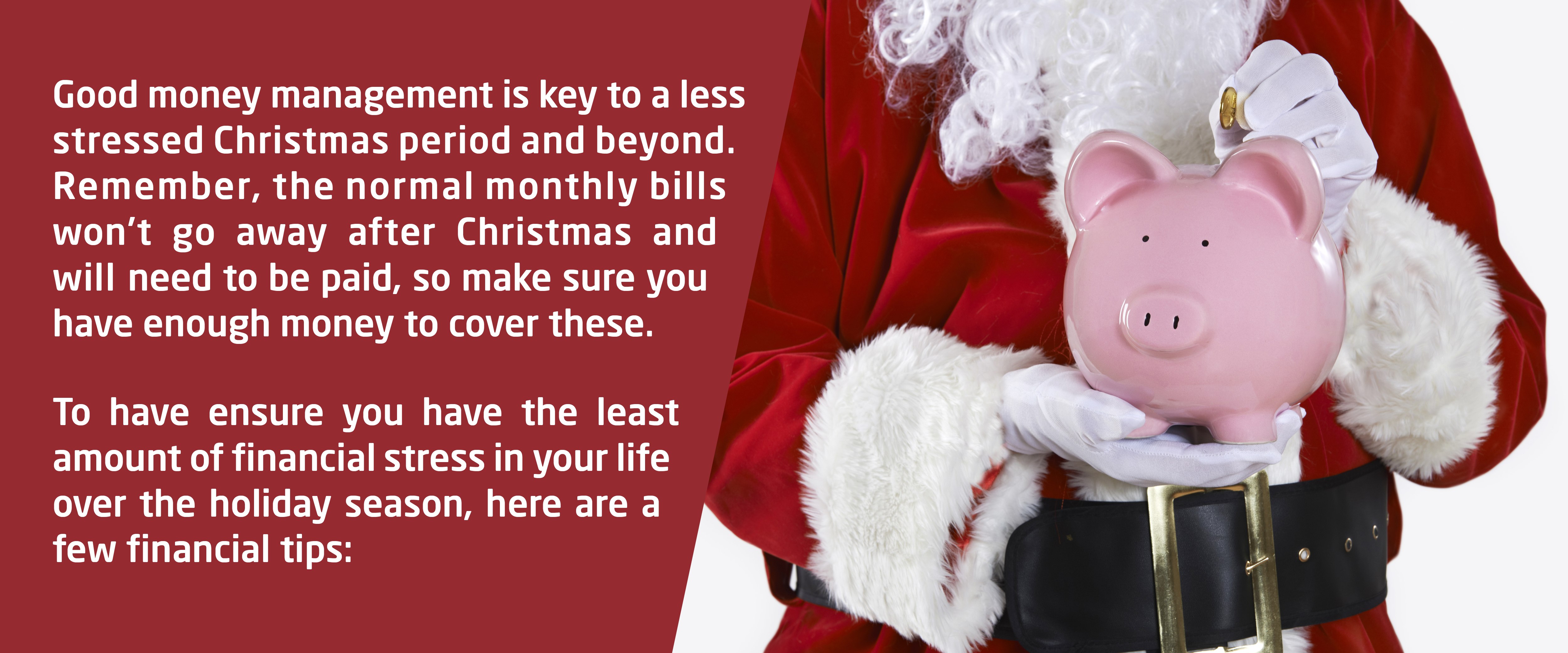
Tackle your attitude towards Christmas spending:
Think about what is a need/necessity and what is a want. Are you going with the crowd and excessively buying to “keep up with the Jones’s?” Will your spending place you into debt and if it does, can you afford the repayments? Is it worth going into debt for a long period for one day?
Write a list of your priorities:
This includes bills and living expenses. Write down the things that you could go without and those things that you cannot.
Be realistic with what you can afford:
You may not be able to celebrate to the same degree you once did when you were with your partner and had two incomes coming in. Be realistic with this. Create a budget – and stick to it! Careful budgeting can help you to stay organised and keep on track with your spending. I had many friends in the past who would say to me, “indulge, it’s Christmas, splurge, it’s only once a year!” However, they were not the ones who had to deal with my bank account if it ended up in the red because of this. Budgeting and keeping to that budget was so important for me. Decide how much you can afford to spend on each of your children and stick to it. Try not to cave into the latest fad or game that will cost more if you buy it around Christmas, especially if you can’t afford it. Waiting it out can mean getting these things at a reduced price later on, for their birthday for instance. It also teaches our children delayed gratification.
Be aware of consumer advertising:
Advertisements will entice you to spend, spend, spend! When those commercials come on the TV, change the channel. Walk by those promotional offers in the supermarket. They only want to sell you things you don’t really need. Children are particularly targeted by advertisers. Teach them in advance that advertisements are designed for us to say at the end, “ I want that item, I need it, let’s buy it!”
Remember children learn from example:
Our children watch our every move and learn from it, they are like sponges. If you want your children to be responsible with money when they grow up, you will need to be responsible now while you are their example.
Don't compare yourself to others:
You can only do what you can do. The most important part of the holiday season is sharing it with family and friends, which doesn’t cost a penny. Don’t compare yourself with others who may be able to get more for their children. Do the best that you can do and make it as special for your children as possible. In the years ahead they won’t remember that expensive gift that you bought them, but they will remember spending quality time together making cookies or singing carols or watching Christmas movies late into the night!

Write a present list and an amount you can spend for each person:
Focus on one person at a time and shop with blinkers on. Make sure to keep within the budget you have set for each individual.
Shop online:
This way you are not tempted to go around the shops and add things into your trolley just because it’s “Christmas.” However, do keep an eye on delivery charges if shopping online. Try and order a few items together from each retailer to save on shipping and postage costs.
Look for discounts:
Things like Groupon are great ways of purchasing things at discounted prices. Look for the sales! If you can find what you’re looking for at a discount or on sale it will release a little more funds for something else.
Speak to your ex and go halves on expensive gifts:
Make sure to communicate with your ex about what gifts you each are planning to purchase for our child(ren). That way you can ensure you don’t end up buying the same thing. If there is a gift they really want and it is expensive, talk to your ex about going halves.
Consider a ‘Secret Santa’ game instead of buying everyone in the extended family gifts:
Buying individual family members gifts can get expensive and put added pressure on us. Speak to your family about choosing a name out of the hat for a secret Santa gift and decide on an amount for each gift.
Recycle bows and gift bags:
Keep gifts bags and bows when they have been taken off wrapping paper and use year after year. It may not seem like much, but if you were to add up how much you spend on bows and bags over the years, you may be surprised… it all adds up!
Scrap sending out paper Christmas cards:
Instead, wish friends and family a Merry Christmas on social media or via email.

Write a grocery-shopping list and stick to it:
Shopping online is helpful, as you are not walking around the shops being enticed by promotions for foods that you do not need.
Shop around:
Lots of supermarkets offer value for money and could reduce your food bill by a lot. Ask yourself, ‘Do you need the branded product, or can you save on own-brand replacements?
Only buy what you need:
Yes, it is nice to have a few extras to enjoy on the day, but is it necessary to load your freezer and fridge up with excess food that may very well be thrown away out of date and never eaten?
If you need to, visit a foodbank:
If finances are very low, foodbanks are there to help you through the hard times. Often these banks also offer presents and toys for children at Christmas.
And finally plan ahead to make next Christmas even easier: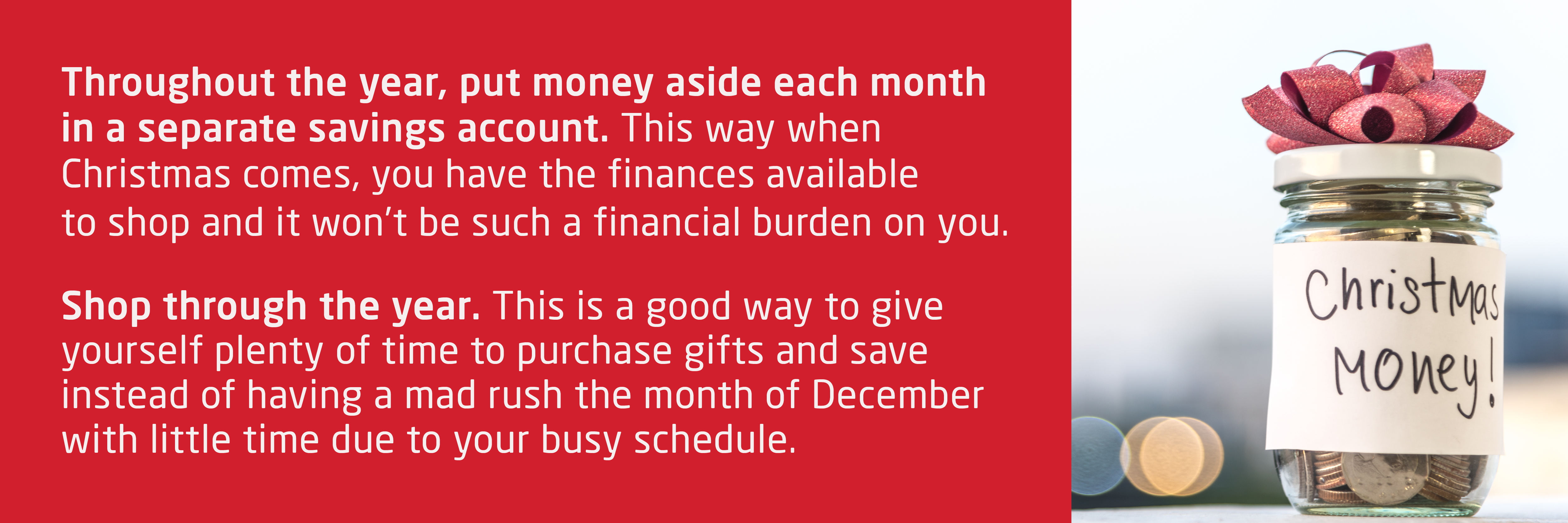
 What will you be spending money on this Christmas?
What will you be spending money on this Christmas?
How are you planning to pay for Christmas? From presents to food, the costs can add up quickly. Using our Christmas Money Planner will help you set a budget for the festive season.
Did you know? The average UK family was planning to spend over £800 on Christmas last year!

Taking the time to manage your money better can really pay off. It can help you stay on top of your bills and save £1,000s each year. You can use these extra savings to pay off any debts you might have, put them towards your pension, or spend them on your next car or holiday. Read on for money management tips, including how to set up a budget, sticking to it and how to save.
- How to set up a budget
- Getting your budget on track
- Paying off loans and credit cards
- Set a savings goal
- If you're overwhelmed by your debts

Figuring out and managing your finances now can save you a lot of time and money in the future. Here are some of the best habits to build to simplify your expenses, accounts and debt.
If you struggle with staying on top of your finances and managing your debts, you are not alone. Whether you need to dig yourself out of extreme debt or you simply want to become more financially responsible, you should consider implementing these seven tips to help you stay on top of your finances.
Automate Your Savings
Saving money is one of the most difficult challenges people face. When that direct deposit reaches your bank account, it can be tempting to spend more than you should. For this reason, you should set up automatic monthly transfers to your savings account. Consider how a percentage of your payslip is automatically deducted for taxes. You don’t miss this money because you never saw or touched it. Automating your savings has the same effect—you will be far less tempted to spend money that never shows up in your bank account.
Create an Emergency Fund
Life can be full of surprises—some worse than others. If your home is damaged by something not covered by your insurance, you get into a car accident, you have an unexpected medical emergency or any number of other incidents, you could end up in serious financial trouble. As a result, it’s never a bad idea to set up an emergency fund to help cover unexpected expenses. A good rule of thumb is to try to save up at least three months’ worth of living expenses. Once this money has been set aside, be sure not to touch it for anything other than an emergency, no matter how tempting it might be.
Stick to a Realistic Budget
The most important aspect of developing healthy financial habits is to create and stick to a realistic budget.
You should be sure to:
• Calculate your income
• Quantify your necessary expenses
• Make a plan for your leftover money
• Cut out unnecessary spending
Cut Out Unnecessary Expenses
Nearly everyone can trim their monthly expenses by identifying and cutting out unnecessary expenses. Especially if you are using credit cards or personal loan companies to pay for things you can’t afford, you should take a look at those expenses and cut them out.
This could include a variety of spending categories, such as:
• Streaming services that you do not use regularly (i.e. Netflix or Spotify etc.)
• Eating out
• Overspending on groceries and clothes
• Gym memberships
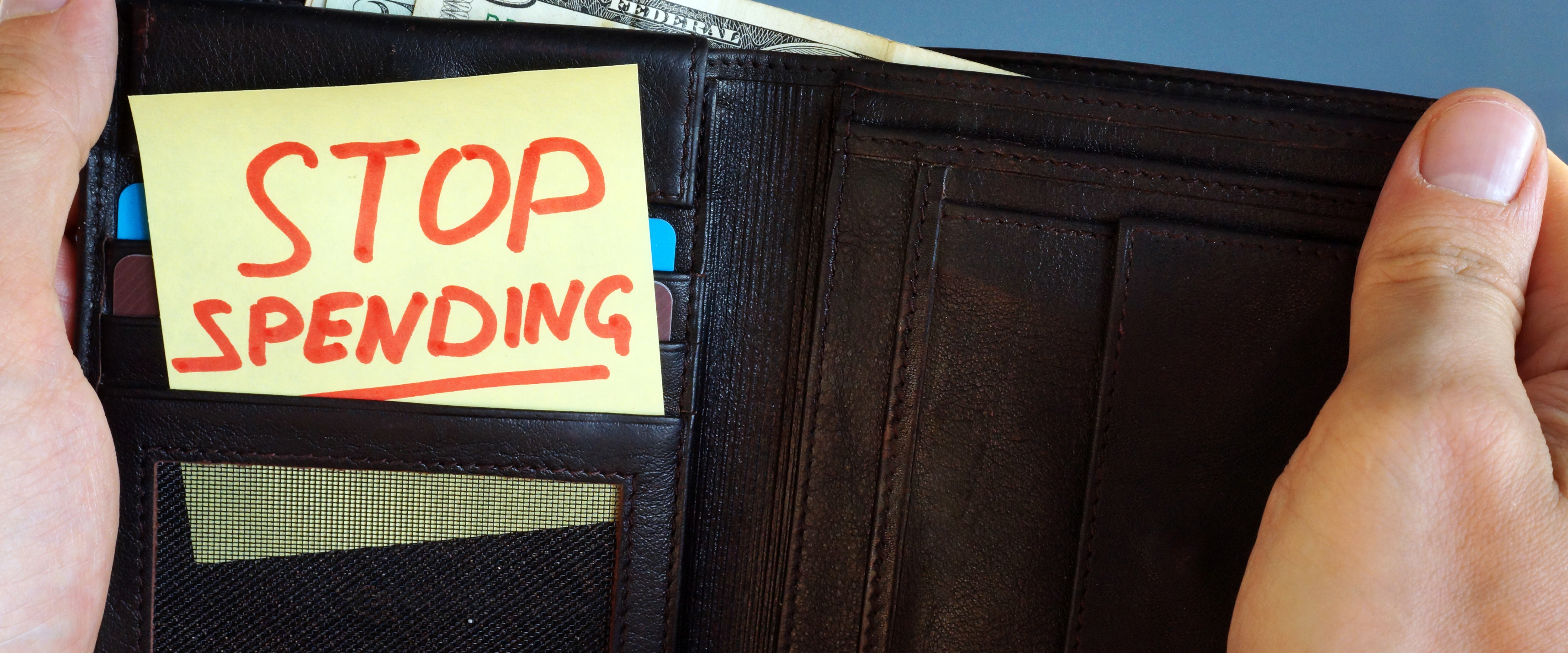
These expenses, among others, can add up to well over £100 per month that would be better off being put toward your debts.
Invest in a Retirement Fund
Investing in a retirement fund is one of the best things you can do while you’re still working. This is another habit that many young professionals avoid, as they would rather hang onto their money. However, you will surely be glad you decided to invest in yourself once you grow older.
There are several retirement plans to choose from, so be sure to do your research and find which one best suits your needs. Additionally, you should talk to your employer about pension options, as many companies offer contribution matching.
Pay Off Credit Cards Every Month
Credit cards should be used with the intention of paying off the balance before interest accrues. Credit card companies typically charge very high interest rates, however credit cards do not need to be avoided altogether, though, as many of them offer incredible benefits such as cash rewards and airline miles. However, one of the most basic principles of financial responsibility is to pay off your credit card balance in full every month.
Make a Plan to Pay Off Your Debt
A good rule is to treat your credit cards the same way as a debit card. Only spend money that is currently available to you unless it is an absolute emergency. Once you have established good financial habits to help you avoid accumulating additional debt, you should create a plan to pay off your existing debts.
One common method is the snowball method. The snowball method suggests that you should pay off your smallest debts first before moving on to larger ones. This tends to motivate you to continue paying off your debts as you feel satisfaction from getting rid of your smaller balances.
Another option is to target your high-interest debts. This can help you save the most money in the long-run and is ideal for individuals who don’t need the additional motivation provided by the snowball method. Others use a debt consolidation loan to lower their interest rate and pay less on the debt over time. Whichever method you choose, be sure that you can stick to it for the long term.
Managing your finances can be quite difficult and stressful. These seven financial literacy tips are great options to help you trim your debts and stay on top of your finances.

References:
1. http://www.moneyadvicetrust.org/media/news/Pages/Money-worries-put-Christmas-at-risk-for-up-to-five-million-Britons-.aspx
2. https://www.priorygroup.com/blog/how-to-cope-with-stress-at-christmas
3. http://www.moneyadvicetrust.org/media/news/Pages/Warning-as-Britons-put-Christmas-on-credit.aspx
4. https://www.nationaldebtline.org/EW/Pages/12-days-of-debt-action-.aspx
5. https://www.moneyandlife.com.au/individuals/family-and-life-events/dealing-stress-debt-christmas
6. https://www.forbes.com/sites/ilyapozin/2016/03/03/the-secret-to-happiness-spend-money-on-experiences-not-things/#2da5bfbe39a6
7. https://www.careforthefamily.org.uk/financial-tips-sps
8. https://www.moneyadviceservice.org.uk/en/articles/beginners-guide-to-managing-your-money
9. https://thriveglobal.com/stories/7-habits-to-help-you-stay-on-top-of-your-finances/







